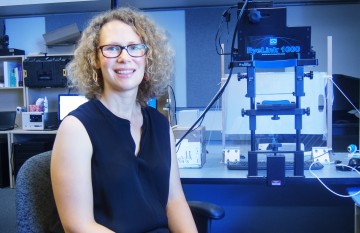“Eye soccer” reveals possible cause for schizophrenia symptoms
The eye movements of schizophrenia patients playing a simple video game provide an intriguing explanation for some of their symptoms, including difficulty with everyday tasks.

Miriam Spering. Photo credit: Brian Kladko
In an experiment conducted by Miriam Spering, an Assistant Professor in the Department of Ophthalmology and Visual Sciences, schizophrenia patients were asked to predict the trajectory of a small dot that appeared briefly on a monitor as it moved toward a vertical line. As an infrared-equipped video camera tracked their eye movements, participants would call out whether it would hit or miss the line.
The schizophrenia patients performed significantly worse than a control group in predicting hits and misses, and they were also not as good at tracking the dot with their eyes. But the impairment of their eye movements alone was not severe enough to explain the difference in their predictive performance, according to results published in the Journal of Neuroscience. So there was some kind of breakdown in their ability to interpret what they saw.
The patients were having trouble generating or using an “efference copy” – a signal sent from the eye movement system in the brain indicating how much, and in what direction, their eyes have moved. The efference copy helps validate visual information from the eyes.
“An impaired ability to generate or interpret efference copies means the brain cannot correct an incomplete perception,” says Dr. Spering, who conducted the dot-tracking experiments as a postdoctoral fellow at New York University, and is now conducting similar studies at UBC. That would explain why schizophrenia patients often have poor motion perception and eye movements, leading them to bump into people while walking or making it a challenge to cross a street.
“But just as a person might, through practice, improve their ability to predict the trajectory of a moving dot, a person might be able to improve their ability to generate or use that efference copy,” Dr. Spering says. “My vision would be a mobile device that patients could use to practice that skill, so they could more easily do common tasks that involve motion perception, such as walking along a crowded sidewalk.”